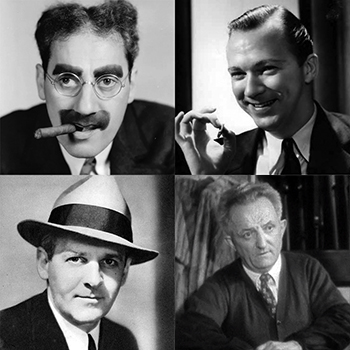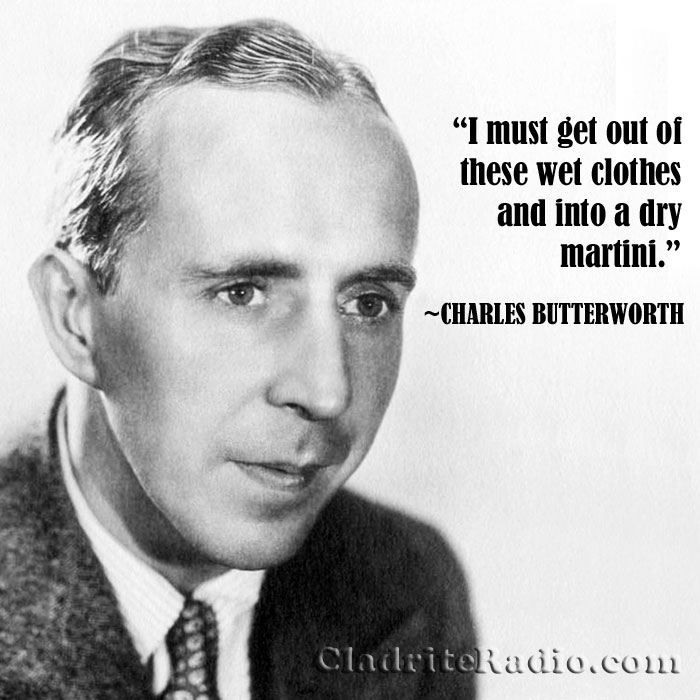Here are 10 things you should know about William Holden, born 104 years ago today. The handsome leading man gave the shortest acceptance speech in Oscar history.
Tag: Sunset Boulevard
10 Things You Should Know About Gloria Swanson
Here are 10 things you should know about Gloria Swanson, born 123 years ago today. The oft-wed Swanson was one of the biggest stars of the silent era.
In Search of the Mysterious Mr. Moskowitz
 One of the joys of being an old-movie buff is when an actor in a bit part sparks your interest and you start to do a little research on him or her, which causes you to tumble down a rabbit hole of odd facts and coincidences. Sometimes one finds unlikely connections between that unfamiliar performer and some much bigger names—such as when, say, Groucho Marx, Lee Tracy, and Walter Winchell have a connection to…Milton Wallace?
One of the joys of being an old-movie buff is when an actor in a bit part sparks your interest and you start to do a little research on him or her, which causes you to tumble down a rabbit hole of odd facts and coincidences. Sometimes one finds unlikely connections between that unfamiliar performer and some much bigger names—such as when, say, Groucho Marx, Lee Tracy, and Walter Winchell have a connection to…Milton Wallace?
We recently attended a screening of Blessed Event (1932), a classic precode comedy in which Lee Tracy plays a character that was obviously inspired by gossip columnist Walter Winchell, who was all the rage back then.
We were especially excited to attend the screening, as we had been informed that some footage that had long since been excised from the picture had been restored. Reportedly, it had been there all along, but only in the print that belonged to the Library of Congress. Virtually no one knew about it till Bruce Goldstein, director of repertory programming at NYC’s Film Forum, screened the print at the TCM film festival and realized what a find he’d uncovered.
For those not familiar with Winchell, we’ll catch you up just a bit: A former vaudevillian, he turned to a scandal-mongering form of journalism when his performing career wound down. His popular newspaper column was syndicated and he had a huge following on national radio, too. He was known for coining any number of phrases still used today, including the above-cited “blessed event” used to signal the pending birth of a baby (the guardians of broadcasting decency in those days were convinced that American ears were too tender for that oh-so-coarse term “pregnant”).
Winchell’s broadcasts included remotely broadcast performances by bands and singers around the country, and right before switching to those remote locations, he would blow a siren whistle and say, “Okay, America!”
In the film, as the title suggests, Tracy’s Winchell-esque character relies on the same “blessed event” catchphrase that Winchell used. But in the restored scene, a short, middle-aged, somewhat stereotypical (though not, in our opinion, disparagingly so) Jewish man, played by one Milton Wallace, shows up at the newspaper office to give Tracy a “blessed event” tip: He, Mr. Moskowitz, and his wife are soon going to have their seventh child and he thinks maybe Tracy would want to put that into his column.
Happy 114th Birthday, Norma Shearer!
There seems to be widespread confusion regarding Norma Shearer’s birthday. Some sources say she was born on August 10, some say August 11, and The New York Times, in its obituary for her, cites August 15. The year is in question too: Was she born in 1900, 1902 or 1904? Biography.com lists her birth as occurring in 1900 and 1902.
We’re going with August 10, 1900, but we cannot promise that’s correct….
Norma Shearer was born Edith Norma Shearer 114 years ago today in Montréal, Québec, Canada. Here are 10 Did-You-Knows about the former Queen of MGM:
- Shearer, who won a beauty contest at 14, moved to NYC with her (stage) mother and sister Athole (who would later marry legendary director Howard Hawks) four years later. After Florenz Ziegfeld passed on casting Shearer in his Follies, she got some small roles in movies.
- Irving Thalberg saw some of her early movie work and in 1923 signed Shearer to a contract with with Louis B. Mayer Pictures, a precursor of MGM, where he was vice-president.
- Shearer made eight—count ’em, 8!—feature pictures in 1924.
- Shearer converted to Judaism to marry Thalberg in 1927 and continued to observe the faith after his death and for the rest of her life.
- Norma’s brother, Douglas, won twelve Academy Awards for his work as a sound designer. The pair were the first brother-and-sister tandem to win Oscars.
- At a point in her career when she appeared in only prestige productions, she played a part in The Stolen Jools (1931), a star-studded short subject intended to raise money for a tuberculosis sanatorium, as the owner of the titular “jools.” Also in the film were such luminaries as Wallace Beery, Buster Keaton, Edward G. Robinson, Laurel and Hardy, and members of the Our Gang cast.
- F. Scott Fitzgerald is said to have based one of his stories, “Crazy Sunday,” on one of Shearer’s parties and the story’s protagonist, Stella Calman, on Shearer herself.
- Weak eye muscles gave Shearer a slightly crossed eye; she worked with eye doctors to improve it and cameramen to disguise it.
- She was the third woman to win the Best Actress Oscar and the second of three consecutive Canadians to win it (Mary Pickford won it in 1929 and Marie Dressler in 1931).
- Among the roles she is reported to have turned down were Scarlett O’Hara (Gone with the Wind), Mrs. Miniver, and Norma Desmond (Sunset Boulevard). Of Scarlett, she said, “Scarlett O’Hara is going to be a thankless and difficult role. The part I’d like to play is Rhett Butler.”
Happy birthday, Norma Shearer, wherever you may be!

Happy 120th Birthday, Charles Butterworth!
Charles Butterworth was born 120 years today in South Bend, Indiana. He’s in the rarefied company of greats like Roland Young, Charles Ruggles and Edward Everett Horton when it comes to making 1930s comedies just that much funnier. Here are ten CB Did-You-Knows:
- Butterworth earned a law degree from the University of Notre Dame, but never practiced, instead entering the journalism field.
- He worked as a journalist for the Chicago American. During those years, he established friendships with Heywood Hale Broun and humorist Frank Sullivan, who was instrumental in Butterworth getting radio work.
- When Butterworth first arrived in New York, he worked for the New York Times as a circulation department canvasser.
- Butterworth also worked as a secretary to author J. P. McEvoy, who was at the time writing the book for a musical called Americana. This gave Butterworth an entrée into the world of theater. He would go on to appear in several Broadway musicals of the 1920s, among them Allez Oop, Good Boy, Sweet Adeline and Flying Colors.
- His first credited film appearance (following a couple of brief, uncredited appearances) was in The Life of the Party (1930).
- Butterworth was known to be adept with humorous ad libs, so much so that some of the screenwriters he worked with in Hollywood came to rely on his ability to fill out an underwritten part with pithy lines of his own making.
- Butterworth was very close friends with fellow humorist Robert Benchley. Benchley is sometimes credited with the line quoted in today’s quote graphic, but he said Butterworth, who spoke the line in Every Day’s a Holiday (1937), but is said to have orginally ad-libbed the quip after falling into a pool at a party.
- Butterworth’s familiar screen character is said to have been the inspiration for cereal mascot Cap’n Crunch.
- He died in 1946 in a single-car automobile accident on Sunset Boulevard. It’s been suggested in some corners that his death was not accidental, that he was despondent over the passing of his pal Benchley some months earlier, but that’s not ever been proven.
- At the time of his death, Butterworth was engaged to actress Natalie Schafer, who would later be cast as Mrs. Thurston Howell III on the television sitcom Gilligan’s Island.
Happy birthday, Charles Butterworth, wherever you may be!

